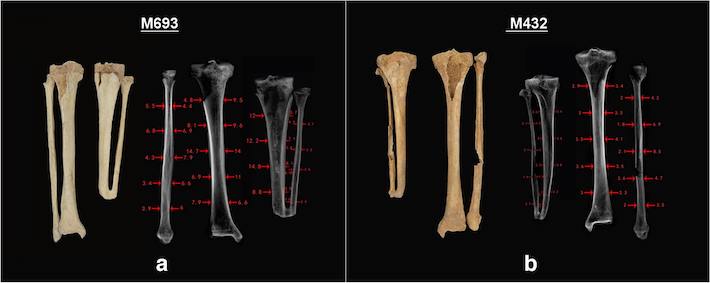 SANMENXIA CITY, CHINA—According to a statement released by Texas A&M University, paleoanthropologist Qian Wang of Texas A&M University, Yawei Zhou and Yanmei Liu of Zhengzhou University, and Fei Yan of the Sanmengxia Institute examined the remains of two men unearthed near the Yellow River in central China’s Henan Province. Based upon the style of their burials, the men are thought to have been low-level officials during the Eastern Zhou Dynasty, between 2,300 and 2,500 years ago. Isotopic analysis of their bones also shows that they ate the protein-rich diet typical of the aristocratic class. One foot and about one-fifth of a leg had been removed from each of the men, likely as a form of punishment known as Yue, in which parts of the body were removed in order to shame the individual for criminal behavior and impair future criminal activity. Both men showed signs of healing, indicating that they had received knowledgeable medical care after the punishment had been inflicted and continued to live for at least several years. Crimes subject to Yue included deceiving the monarch, fleeing from duties, and stealing. “On some occasions, it could [serve as] a reduced penalty in lieu of death to reflect leniency,” Wang concluded. To read about 4,000-year-old decapitated skeletons that were uncovered in northeastern China, go to "Hunting Heads."
SANMENXIA CITY, CHINA—According to a statement released by Texas A&M University, paleoanthropologist Qian Wang of Texas A&M University, Yawei Zhou and Yanmei Liu of Zhengzhou University, and Fei Yan of the Sanmengxia Institute examined the remains of two men unearthed near the Yellow River in central China’s Henan Province. Based upon the style of their burials, the men are thought to have been low-level officials during the Eastern Zhou Dynasty, between 2,300 and 2,500 years ago. Isotopic analysis of their bones also shows that they ate the protein-rich diet typical of the aristocratic class. One foot and about one-fifth of a leg had been removed from each of the men, likely as a form of punishment known as Yue, in which parts of the body were removed in order to shame the individual for criminal behavior and impair future criminal activity. Both men showed signs of healing, indicating that they had received knowledgeable medical care after the punishment had been inflicted and continued to live for at least several years. Crimes subject to Yue included deceiving the monarch, fleeing from duties, and stealing. “On some occasions, it could [serve as] a reduced penalty in lieu of death to reflect leniency,” Wang concluded. To read about 4,000-year-old decapitated skeletons that were uncovered in northeastern China, go to "Hunting Heads."
Ancient Skeletons from China Bear Marks of Punitive Amputation
